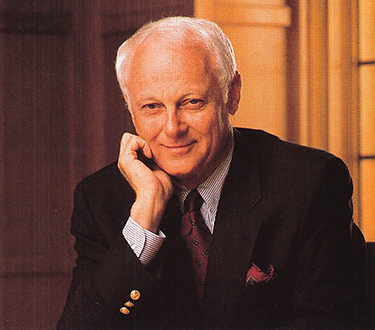President William Gerberding to step down in June 1995
 Dr. William P. Gerberding announced at the Jan. 21 Board of Regents meeting that he will resign his presidency at the University of Washington at the end of the 1994-95 academic year—June 30, 1995—16 years after he took over as university president.
Dr. William P. Gerberding announced at the Jan. 21 Board of Regents meeting that he will resign his presidency at the University of Washington at the end of the 1994-95 academic year—June 30, 1995—16 years after he took over as university president.
“I can’t imagine having had a better president for the University of Washington than Bill Gerberding,” said Paul Skinner, president of the board of regents. “His accomplishments are legion, from skillfully guiding the University through one of its most difficult financial periods in the early 1980s to the successful completion of the Campaign for Washington. He has brought intelligence, drive, and wisdom to a very demanding job, and he has handled it all with grace and brilliance. He continues to enjoy the complete support and confidence of the regents.”
“It has been a privilege to be president of this great University for so many years,” said Gerberding. “I regard myself as a lucky and fulfilled person, and my wife and I are grateful to the many people inside and outside the University who have given us so much support and encouragement.
“The presidency of the University of Washington, located in this attractive and progressive community, is widely regarded as one of the best administrative positions in American higher education today. I am confident the University will attract a leader capable of seizing the many exciting and expanding opportunities here.
“I do not expect to retire, but what I’ll be doing after June 30, 1995, remains to be seen.”
The UW Board of Regents will appoint this spring a broadly representative search committee reflecting the University’s diversity to begin a national search for Gerberding’s successor. It is expected that the next president will assume the office July 1, 1995.

The three living UW presidents gathered during the UWs 125th anniversary celebration in 1986-87. From the left are john Hogness, Charles Odegaard and William P. Gerberding.
Gerberding, who is 64, came to UW July 1, 1979, from the University of Illinois at Urbana-Champaign, where he was chancellor. Prior to that he was executive vice chancellor at UCLA.
Gerberding’s tenure as president has been marked by increased support for the University, both public and private; an emphasis on improving undergraduate education; the opening of branch campuses in Bothell and Tacoma; and a major effort to modernize the University’s facilities through construction of the Kenneth S. Allen Library, the new Physics/Astronomy Building, a new chemistry building, additions to the Magnuson Health Sciences Center and other capital projects.
“The Gerberding years have been characterized by a campus climate of civility and mutual trust, and by increased understanding of and appreciation for the University in the broader community,” noted Regent Mari Clack, vice president of the board.
Private support for the University has grown dramatically under Gerberding’s leadership. The University’s first major fund drive, the Campaign for Washington, raised more than $284 million in gifts and pledges from 1987-92. The University’s Consolidated Endowment Fund increased from approximately $15 million when Gerberding became president to more than $275 million at the beginning of 1994.
Gerberding is one of the longest serving university presidents in the nation, ranking fourth in seniority among the presidents of the 59 major research universities in the Association of American Universities. At the time he steps down, Gerberding will have been president longer than anyone in the history of the University. President Emeritus Charles Odegaard served 15 years (1958-73).
Gerberding earned his baccalaureate degree in philosophy from Macalester College in St. Paul, Minn., in 1951, where he met his wife of 42 years, Ruth, a 1953 graduate. They have four grown children, David, Steven, Liza and John, and one grandchild.
Gerberding received his master’s degree in 1956 and his doctorate in 1959, both in political science, from the University of Chicago. A specialist in U.S. foreign policy, he was a member of UCLA’s political science faculty from 1961 to 1972, and in 1966 was one of four recipients of the Distinguished Teaching Award given annually by the UCLA Alumni Association. At the UW, Gerberding is a professor in the political science department.